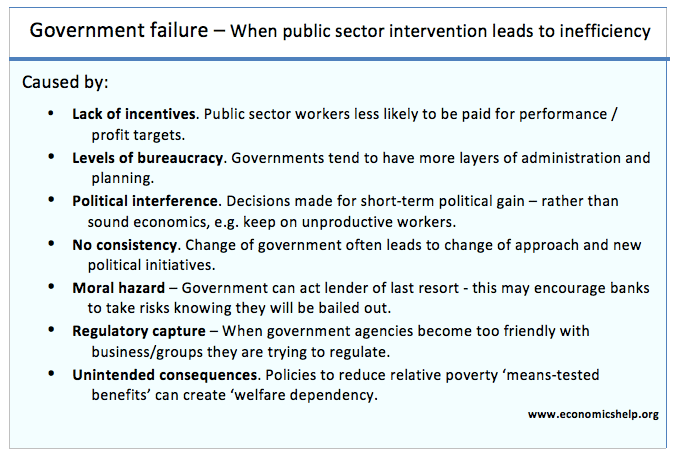Definition of government failure:
This occurs when government intervention in the economy causes an inefficient allocation of resources and a decline in economic welfare.
Often government failure arises from an attempt to solve market failure but creates a different set of problems.
Reasons for government failure
- Lack of incentives: In the public sector, there is limited or no profit motive. Because workers and managers lack incentives to improve services and cut costs it can lead to inefficiency. For example, the public sector may be more prone to over-staffing. The government may be reluctant to make people redundant because of the political costs associated with unemployment.
- Poor information, politicians may have poor information about the type of service to provide. Politicians may not be experts in their department but concentrate on their political ideology.
- Political interference Decisions made for short-term political gain – rather than sound economics, e.g. keep on unproductive workers. e.g. politicians may take the short-term view rather than considering the long-term effects
- No consistency. Change of government often leads to change of approach and new political initiatives
- Moral hazard. The government may offer a guarantee to all bank deposits to protect the financial system, but this could encourage banks to take risks – because they know they can be bailed out by the government.
- Regulatory capture – When government agencies become too friendly with business/groups they are trying to regulate
- Unintended consequences. Policies to reduce relative poverty ‘means-tested benefits’ can create ‘welfare dependency.’ For those on means-tested benefits, moving from benefits to work could lead to very little extra income because of lost benefits and higher taxes. Benefits can then solve one problem of relative poverty but create new problems of higher spending and lower levels of labour market participation.
- Special interest groups. In the US, many types of business have special tax credits for their industry; this makes it difficult to reform the tax system, and leads to horizontal inequality – business with same income can be treated differently. In the Europe, farmers receive substantial financial support from the EU, making it difficult to reform CAP. Once people are used to receiving subsidies it can be politically difficult for the government to take it away.
Examples of government failure

- White elephant projects. Concorde supersonic airliner was a joint venture between British and French government. It was seen as a prestigious venture, so even when studies suggested it was uneconomic, politicians didn’t want to back-track but kept putting in public money. Developing Concorde cost the British and French governments £1.1 billion (about £11 billion in 2003 prices) before it even went into service—nearly ten times what was budgeted. (Economist)
- Tax leads to fly-tipping. A tax on rubbish is a policy to overcome market failure. To try and include the external cost of rubbish in the price. However, a tax on rubbish can lead to illegal dumping of rubbish on the roads. This creates a different problem of fly-tipping.
- Common Agricultural Policy. The CAP was intended to solve market failure in agriculture and protect farmers incomes, but the EU didn’t take into account minimum prices would lead to over-supply; there were also unintended consequences of trade wars and environmental problems from farmers trying to supply as much as they could. See: CAP.
- Prohibition strengthened the mafia. When the government banned alcohol in the US, it caused the mafia to supply alcohol, leading to a rise in organised crime.
Overcoming government failure
There are various things the government can try and do to overcome government failure
- Give performance targets/profit incentives
- Competitive tendering – where public sector bodies face competition from the private sector for the right to run a public service.
- Employing outside private sector consultants to make decisions about how to cut costs.
- Delegating certain decisions to non-political bodies. For example, setting interest rates was given to the Bank of England as politicians often set interest rates for political reasons.
- See also: How to overcome government failure
Evaluation of government failure
It should be remembered many public services are not subject to the same profit goals. It is difficult to give a profit motive in health or education because the goal is not profit but the quality of service.
Also, although government failure is a real issue, it is often much less than the problems arising from market failure. Just because government intervention may be inefficient, doesn’t mean we should try to tackle problems of pollution e.t.c.
Related


1 thought on “Government Failure”
Comments are closed.